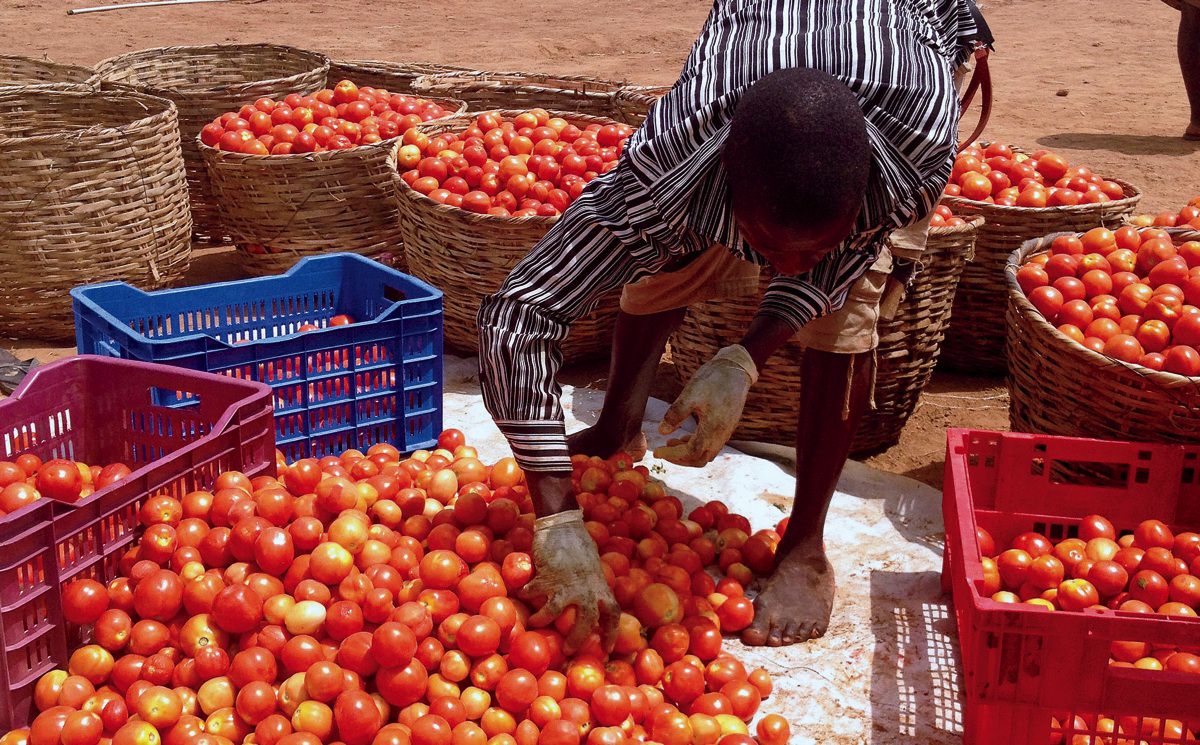As prices of commodities surge, Nigerians have expressed displeasure especially on the quantity of food items now sold at high prices.
Investors King reports from an online survey on the prices of food items in different regions of the country.
While residents in the west and east decried the prices of tomatoes, pepper, onions, egg, chicken and some other food items, they envied the northerners who according to them are enjoying these items in large quantities at cheaper rates.
Viewing the quantity of pepper and onions sold in Kano for N50, a dweller of the east exclaimed, “Wow! People dey enjoy for North. That Onions and Pepper go reach N400 for East. Things too cost here.”
A resident of Ogun state, showing the items she purchased at the market, lamented that she couldn’t get all the items on her list due to the increased prices.
She said a crate of eggs which was formerly N600 and N850 is currently sold for N1800. After bargaining on the price of a basket of tomatoes, she bought it for N1500 and 5kg of chicken for N8500.
“These are some of the things I got last Saturday from the market. The price of things continues to rise on a daily basis. I couldn’t get some of the things on my list because the money wasn’t enough to cover the rest of the other items. Life isn’t getting any easier,” she said.
A resident of Benin also aired his voice, saying a crate of eggs is now 1,850 while a basket of tomatoes goes for N1,000.
“Only God can help us out. Things are expensive especially foods and food materials and some Nigerians can not boast of making $5 per day. Our leaders are there enjoying themselves. To make things worse, ‘na Poor man pikin dem go still use for rituals.’ We need your help O Lord!” he said.
Meanwhile, a dweller of Magodo in Lagos State stated that the basket of tomatoes sold for N1500 in Ogun state cannot be sold less than N2500 in his area.
“I’m still hopeful that things will get better. Nigeria has been through worse and still survived. The major problem we have is lack of consistency,” one of them expressed hope.
Samed Olukoya, a Senior Analyst at Investors King, explained that some of the factors responsible for the continuous rise in the price of commodities are scarcity caused by farmers and herders crisis, government policies and transportation costs in conveying the goods to different locations.
In his words, “Rise in the prices of food items can be attributed to scarcity caused by farmers and herders crisis, bandit and other insecurity issues. For instance, most farmers can no longer cultivate on their farms or harvest because of kidnappers or killer herdsmen. The few that managed to do so are ready to part with it for a substantial amount.
“Also, the persistent increase in costs due to government policy is another factor pressuring the price of food items. Transportation cost to the city, cost of imported fertilizer, preservatives, etc have to be added to the price of a unit item.”
Speaking on the lower price of food items in the north, Olukoya said, “The North is known for its agriculture, hence the price disparity in food items between North and other parts of the country. It is also imperative to factor in the cost of transportation from the North to other regions, warehousing and prevalent insecurities that are preventing free movement of goods across the nation.”
Olukoya added that the situation is worsened by the nation’s weak wage growth, low household income and a high unemployment rate of 33.33 percent.
In his recommendation, he charged the government to ease rising prices of food items and address insecurity in the country as well as increase financial support for farmers.


 Forex3 weeks ago
Forex3 weeks ago


 Naira2 weeks ago
Naira2 weeks ago
 Billionaire Watch2 weeks ago
Billionaire Watch2 weeks ago




 Naira2 weeks ago
Naira2 weeks ago




 Naira2 weeks ago
Naira2 weeks ago




 Naira1 week ago
Naira1 week ago




 Naira4 weeks ago
Naira4 weeks ago




 Naira3 weeks ago
Naira3 weeks ago



















